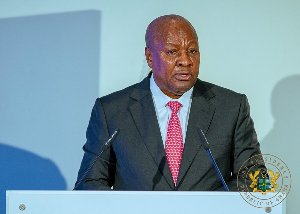Africa’s continental institutions, their partners and the African private sector have been urged to work more closely and much faster to ensure that the continent benefits fully from the expected implementation of the African Continental Free Trade Area (AfCFTA) agreement.
The call was made by Ekwow Spio-Garbrah, Ghana’s former Minister of Trade and Industry, at a high-level consultation of African economics, trade, industry and private sector experts meeting at the United Nations Economic Commission for Africa (UNECA) headquarters in Addis Ababa, Ethiopia, to examine and decide on the dimensions of an African Country Business Index (ACBI) project.
The ACBI is expected to provide data on the state of preparedness of the African business community for the implementation of the agreement on the AfCFTA.
The two-day meeting was attended by officials of the UNECA, the African Union Commission AUC), the African Development Bank, the International Trade Centre
(ITC) of the UN, the United Nations Conference on Trade and Development (UNCTAD) and other experts representing various private sector associations and entities from the various regions of Africa, and some European Universities.
In addresses at the opening and closing of the meeting, Ekwow Spio-Garbrah drew attention to the fact that if Africa accounted for only 2% of global trade and the AfCFTA was intended partly to improve on this African share of world trade, then African institutions and their partners must work more effectively together and take faster decisions and actions if Africa is to catch up with the rest of the world.
With regards to the ACBI project, which involves an initial research component to gauge the pe4rceptions of the African private sector with regards to the operations of current regional trade agreements and the proposed AfCFTA, Ekwow Spio-Garbrah invited the African pan-African institutions to take into fuller account the content of existing research outputs of various international public and private organisations, as well as African trade and industry associations which routinely undertake similar studies.
Ekwow Spio-Garbrah noted, for example, that the ITC of the UN undertakes quite comprehensive studies of some aspects of the issues of interest to the ACBI, and so do such institutions as the World Bank, IFC, the World Economic Forum and the Organisation of Economic Cooperation and Development (OECD), based in Europe.
In addition, noted Ekwow Spio-Garbrah, most African national and regional chambers of commerce and some private sector industry associations undertake their own national and regional studies of their members from time to time.
It was necessary, suggested Ekwow Spio-Garbrah that the current research endeavours of the ACBI involve some partnerships and collaborations with some of these existing institutions so as to avoid unnecessary and expensive duplication of efforts.
Spio-Garbrah noted that the countries that were members of the UNECA, ITC, EU, AfDB, World Bank and others were often the same countries, making regular annual contributions to these same bodies.
The expert group meetings took note of some challenges faced by consulting firms which had been engaged by the UNECA to undertake pilot research in some two African countries, to test the research hypothesis and questionnaires and to report on progress to the meeting.
Spio-Garbrah noted that part of the challenges being faced by the consultants could represent “research fatigue” from African businesses whose senior officials often had to set aside valuable commercial time to respond to questionnaire enquiries, which although important and laudable was often seen as interfering in the business organisation’s normal commercial and profit-seeking activities.
Spio-Garbrah hoped that African public and private businesses would cooperate with the research team to enable the pan-African organisations obtain a clearer picture of the challenges facing cross-border traders in Africa, so as to deal with knowledge gaps and non-tariff barriers to boost intra-African trade.
Spio-Garbrah drew the attention of the meeting to the fact that such research studies as are being undertaken with the ACBI and AfCFTA process were not end in themselves.
Rather, they are opportunities to identify critical knowledge gaps as well as where specific policies, legislation, regulation or actions of some institutions interfere with the effort to make trading regimes in Africa more efficient.
He opined that such knowledge gaps often had to be addressed with very intensive sensitization, public education and communication strategies.
Spio-Garbrah advised the UNECA, the AUC, the AfDB and other partners not to wait for the final outcome of research findings before beginning the process of initiating action to identify individuals and firms who could assist with addressing the knowledge gaps through various public communications interventions.
He likened the process to a medical examination where the symptoms and diagnosis may not be known in advance, but hospitals and clinics still stock some basic drugs in advance of prescriptions, in the knowledge that sooner or later the patients will need some drugs.
Spio-Garbrah opined that various aspects of the African trading systems suffered from a variety of ailments, many of which were already well-known. So while undertaking the important diagnostic studies to establish an ACBI, parallel preparations should also be initiated to procure some of the medication that is likely to be needed to address some of the ailments.
The survey of African businesses for the ACBI and in support of the AfCFTA is ongoing and is expected to be concluded in 2020 and preferably before July 1st 2020 when the AfCFTA is expected to become operationalized.
Business News of Wednesday, 11 December 2019
Source: Ekwow Spio-Garbrah













